Antagonism Study guides, Class notes & Summaries
Looking for the best study guides, study notes and summaries about Antagonism? On this page you'll find 2013 study documents about Antagonism.
Page 3 out of 2.013 results
Sort by
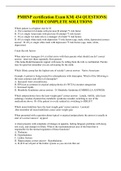
-
PMHNP certification Exam KM| 434 QUESTIONS| WITH COMPLETE SOLUTIONS
- Exam (elaborations) • 37 pages • 2023
- Available in package deal
-
- $13.99
- 1x sold
- + learn more
Which patient is at highest risk for SI A. 30y/o married AA female with previous SI attempt *1 risk factor B. 35 y/o single Asian male with previous SI attempt *3 risk factors C. 38 y/o single AA male who is a manager of a bank *2 risk factors D. 68 y/o single white male with depression *5 risk factors (age, male, white, depression) correct answer: D. 68 y/o single white male with depression *5 risk factors (age, male, white, depression) Count the risk factors When interview teenagers...
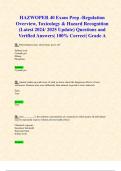
-
HAZWOPER 40 Exam Prep -Regulation Overview, Toxicology & Hazard Recognition (Latest 2024/ 2025 Update) Questions and Verified Answers| 100% Correct| Grade A
- Exam (elaborations) • 32 pages • 2024
- Available in package deal
-
- $10.99
- + learn more
HAZWOPER 40 Exam Prep -Regulation Overview, Toxicology & Hazard Recognition (Latest 2024/ 2025 Update) Questions and Verified Answers| 100% Correct| Grade A Q: Polyurethane foam, when burnt, gives off: Sulfuric acid Cyanide gas Ethane Phosphine Answer: Cyanide gas Q: Animal studies provide most of what we know about the dangerous effects of toxic substances. Humans may react differently than animals exposed to toxic materials. False True Answer: True Q: A(n...
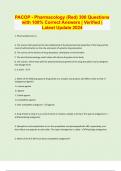
-
PACOP - Pharmacology (Red) 300 Questions with 100% Correct Answers | Verified | Latest Update 2024
- Exam (elaborations) • 52 pages • 2024
- Available in package deal
-
- $15.49
- + learn more
1. Pharmacodynamics is: A. The science that examines the interrelationship of the physiochemical properties of the drug and the route of administration on the rate and extent of systemic drug absorption B. The science of the kinetics of drug absorption, distribution and elimination C. The part of pharmacology, which deals with what a drug does to the body D. The science, which deals with the physiochemical properties of the drug that allow it to be designed into dosage forms E. A and B - ...
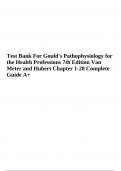
-
Test Bank For Gould's Pathophysiology for the Health Professions 7th Edition Van Meter and Hubert Chapter 1-28 | Newest Version
- Exam (elaborations) • 233 pages • 2023
-
- $34.49
- 4x sold
- + learn more
Test Bank For Gould's Pathophysiology for the Health Professions 7th Edition Van Meter and Hubert Chapter 1-28 | Newest Version. The best definition of the term prognosis is the a. precipitating factors causing an acute episode. b. number of remissions to be expected during the course of a chronic illness. c. predicted outcome or likelihood of recovery from a specific disease. d. exacerbations occurring during chronic illness. ANS: C 4. Which of the following is considered a systemic sign...
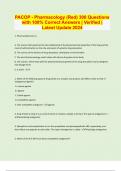
-
PACOP - Pharmacology (Red) 300 Questions with 100% Correct Answers | Verified | Latest Update 2024 | 52 Pages
- Exam (elaborations) • 52 pages • 2023
-
- $22.49
- + learn more
1. Pharmacodynamics is: A. The science that examines the interrelationship of the physiochemical properties of the drug and the route of administration on the rate and extent of systemic drug absorption B. The science of the kinetics of drug absorption, distribution and elimination C. The part of pharmacology, which deals with what a drug does to the body D. The science, which deals with the physiochemical properties of the drug that allow it to be designed into dosage forms E. A and B - ...
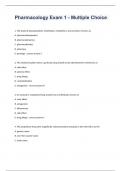
-
Pharmacology Exam 1 - Multiple Choice questions with answers graded A+
- Exam (elaborations) • 26 pages • 2024
- Available in package deal
-
- $17.99
- + learn more
Pharmacology Exam 1 - Multiple Choice 1. The study of drug absorption, distribution, metabolism, and excretion is known as A. pharmacotherapeutics B. pharmacodynamics C. pharmacokinetics D. pharmacy E. posology - correct answer C 2. The medical situation when a particular drug should not be administered is referred to as A. side effect B. adverse effect C. drug allergy D. contraindication E. antagonism - correct answer D 3. An unusual or unexpected drug reaction by an individua...
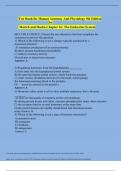
-
Test Bank for Human Anatomy And Physiology 9th Edition by Marieb and Hoehn Chapter 16: The Endocrine System
- Exam (elaborations) • 9 pages • 2023
-
- $16.49
- 1x sold
- + learn more
MULTIPLE CHOICE. Choose the one alternative that best completes the statement or answers the question. 1) Which of the following is not a change typically produced by a hormonal stimulus? A) stimulates production of an action potential B) alters plasma membrane permeability C) induces secretory activity D) activates or deactivates enzymes Answer: A 2) Regulating hormones from the hypothalamus A) first enter into the hypophyseal portal system B) B) enter the hepatic portal system, w...
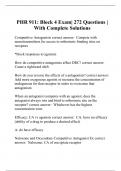
-
PHR 911: Block 4 Exam| 272 Questions | With Complete Solutions
- Exam (elaborations) • 47 pages • 2023
- Available in package deal
-
- $12.99
- + learn more
Competitive Antagonists correct answer: Compete with neurotransmitters for access to orthosteric binding sites on receptors *block responses to agonists How do competitive antagonists affect DRC? correct answer: Cause a rightward shift How do you reverse the effects of a antagonists? correct answer: Add more exogenous agonist or increase the concentration of endogenous for that receptor in order to overcome that antagonism When an antagonist competes with an agonist, does the anta...
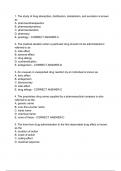
-
Pharmacology Exam 1 - Multiple Choice Questions And Answers
- Exam (elaborations) • 22 pages • 2024
- Available in package deal
-
- $7.99
- + learn more
1. The study of drug absorption, distribution, metabolism, and excretion is known as A. pharmacotherapeutics B. pharmacodynamics C. pharmacokinetics D. pharmacy E. posology - CORRECT ANSWER-C 2. The medical situation when a particular drug should not be administered is referred to as A. side effect B. adverse effect C. drug allergy D. contraindication E. antagonism - CORRECT ANSWER-D 3. An unusual or unexpected drug reaction by an individual is known as A. toxic effect B. antagon...
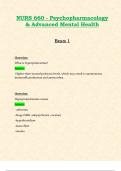
-
NURS 660 / NURS660 Exam 1 (Latest 2024 / 2025): Psychopharmacology and Advanced Mental Health | Complete guide with Questions and Verified Answers | 100% Correct - Maryville
- Exam (elaborations) • 67 pages • 2024
- Available in package deal
-
- $7.99
- + learn more
Exam 1: NURS660 / NURS 660 (Latest 2024 / 2025) Psychopharmacology and Advanced Mental Health Exam | Complete guide with Questions and Verified Answers | 100% Correct - Maryville Q: What is Hyperprolactinemia? Answer: Higher-than-normal prolactin levels, which may result in spontaneous breastmilk production and amenorrhea. Q: Hyperprolactinemia causes Answer: -adenoma -drugs (SSRI, antipsychotics, cocaine) -hypothyroidism -mass effect -trauma Q: Hyperprolactinemia Tx Answer: dopamine agonists (c...

$6.50 for your textbook summary multiplied by 100 fellow students... Do the math: that's a lot of money! Don't be a thief of your own wallet and start uploading yours now. Discover all about earning on Stuvia


